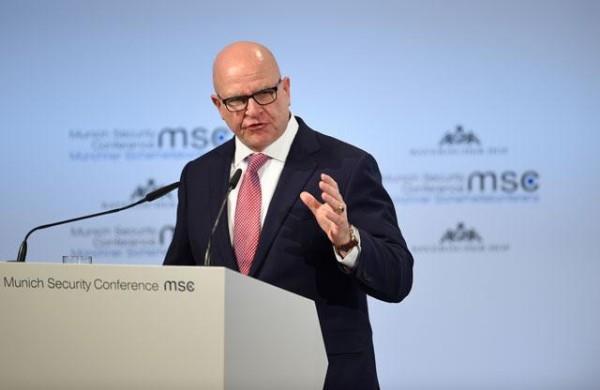
US calls for action to halt Iran's growing 'network of proxies'
McMaster accused Iran of escalating a campaign to increase its influence in the Middle East by building and arming "Hizbollah-style" proxy armies in Iraq, Syria and elsewhere as it has done in Lebanon.
The goal was to weaken Arab governments and turn the proxy forces against those states if they pursued policies that ran counter to Tehran's interests, he said."So the time is now, we think, to act against Iran," he told the Munich Security Conference, calling on US allies to halt trade that was helping underwrite the expansion of Iran's Revolutionary Guards, the most powerful military and economic force in the Islamic Republic.
The United States deems Lebanon's Hizbollah a terrorist organisation."What's particularly concerning is that this network of proxies is becoming more and more capable," he said.
Iran has denied accusations that it meddles in the affairs of its Middle East neighbours and has dismissed suggestions it stop supporting groups such as Hizbollah.Nuclear deal
McMaster also railed against the 2015 nuclear accord signed by Iran and six other countries, saying investments made by German firms and others were helping fund Iran's missile programme and its other activities in the Middle East.
Echoing President Donald Trump's view, he said it was time to address "serious flaws in the Iran deal and counter Iran's destabilising activities including its development and proliferation of missiles".
Trump has been pushing for changes to the 2015 nuclear agreement under which Iran agreed to limit its nuclear activities in return for the lifting of many sanctions.Iran insists it is implementing the nuclear agreement and has warned Washington of consequences if the accord is scrapped.
McMaster said those who invested in Iran were essentially funding activities by Iran's Revolutionary Guard.He said Iran's biggest trading partners were Russia and China, but also included Japan, South Korea and Germany.
"As a matter of international security and moral conscience we must stop doing business with [Iran Revolutionary Guard] affiliated interests, encourage the development of a true commercial sector in Iran and pressure the regime to respect the rights of its people," he said.A senior Russian diplomat, Sergei Kislyak, said that Washington's efforts on the Iran nuclear deal would represent an "enormous blow" to non-proliferations efforts.
"We want this treaty... to continue," he said. "We hear more and more signals from Washington to the extent that they are considering revisiting the participation in the treaty. If that is going to happen, that would be an enormous blow to the collective effort to make sure that non-proliferation efforts survive."

Legal Disclaimer:
MENAFN provides the
information “as is” without warranty of any kind. We do not accept
any responsibility or liability for the accuracy, content, images,
videos, licenses, completeness, legality, or reliability of the information
contained in this article. If you have any complaints or copyright
issues related to this article, kindly contact the provider above.

















![Rajkummar Rao-Patralekhaa Become Parents, Adorable Baby Shower Pics Surface Online [PHOTOS]](/Updates/index/HTML_Images/NewsEn_MoreStories_img_9.jpg?1110348317)
Comments
No comment